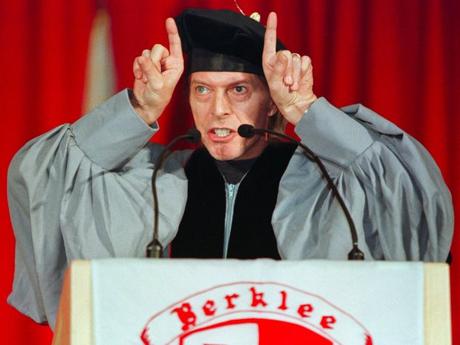 David Bowie passed away Sunday, after an 18-month battle with cancer. This came as a shock to his fans throughout the world, unaware the icon was even ill.
David Bowie passed away Sunday, after an 18-month battle with cancer. This came as a shock to his fans throughout the world, unaware the icon was even ill.
Bowie released his final album, , two days prior, on his 69 th birthday. It is clear now the album was intended to be his swan song, a final statement in an unparalleled career. The fact he was able to conceal his terminal condition from the world in order to orchestrate such a graceful exit proves his consummate artistry and mastery of perception to the very, literal, end.
Blackstar is a deathbed testament along the lines of Johnny Cash's "Hurt" or Freddie Mercury's thinly veiled Innuendo. There is little humor on Blackstar, but David Bowie, who was never satisfied to stay in one artistic place for long, threaded his unique sense of humor throughout his wildly diverse work.
This humor was in full display one May morning in 1999 when he delivered the commencement speech to the graduating class at Berklee College of Music, having received an honorary doctorate from the institution (along with jazz master Wayne Shorter).
I was fortunate enough to be in the audience that spring day, and I shook Mr. Bowie's hand as he handed me my diploma. "Congratulations, man," he said to me, pulling me into his fierce grip with a solid, sincere stare, locking our eyes for a tangible moment. He wasn't just going through the motions with limp disinterest - he forged an intense connection with each of the 580 music students he greeted that morning. His energy was electric.
His speech that day was insightful, incongruous, inspirational and, above all, funny. He talked of the myriad of influences that helped shape his artistry.
What if you combined Brecht-Weill musical drama with rhythm and blues? What happens if you transplant the French chanson with the Philly sound? Will Schoenberg lie comfortably with Little Richard?...And then I went on a crusade, I suppose, to change the kind of information that rock music contained. I adored Coltrane, Harry Parch, Eric Dolphy, Velvet Underground, John Cage, Sonny Stitt. Unfortunately, I also loved Anthony Newley, Florence Foster Jenkins, Johnnie Ray, Julie London, the legendary Stardust Cowboy, Edith Piaf and Shirley Bassey.
It made perfect sense to me.
This was followed by an anecdote about a dive club, Dame Shirley Bassey and a sink.
As a musician, he knew his imagination would have to transcend his own limitations. He fully confessed - standing in front of Wayne Shorter, no less - that he simply lacked the authenticity required to play the music he loved most: American jazz and rhythm & blues.
So he made his music into art.
I didn't feel comfortable as a folk singer or an R&B singer or a balladeer. I was drawn more and more to the idea of manipulation of signs, rather than individual expression...It wasn't so much about how I felt about things, but rather, how things around me felt. To put it simply, I had discovered the Englishman's true place in rock and roll.
The rest of his speech that day was peppered with his enormous sense of humor: tips on venereal disease, inside music school jokes ("Rockers! Jazzers! Samplers!"), anecdotes involving Brian Eno, John Lennon and the aforementioned Shirley Bassey - and his even bigger generosity of spirit.
The world has lost a giant, and the stars look very different today indeed.
Music has given me over 40 years of extraordinary experiences. I can't say that life's pains or more tragic episodes have been diminished because of it. But it's allowed me so many moments of companionship when I've been lonely and a sublime means of communication when I wanted to touch people. It's been both my doorway of perception and the house that I live in.I only hope that it embraces you with the same lusty life force that it graciously offered me. Thank you very much and remember, if it itches, play it.
